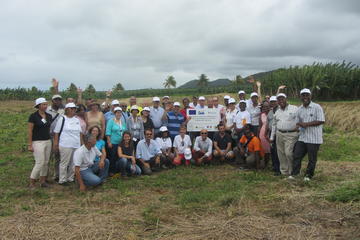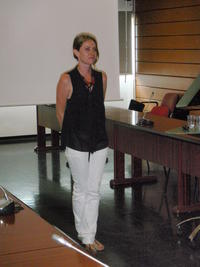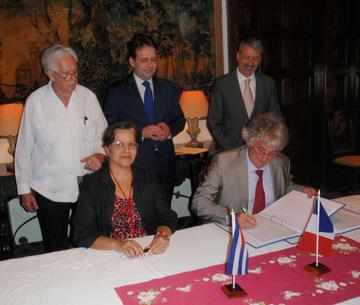2015
The project is coming to an end ... and preparing for the future!
The project is coming to an end ... and preparing for the future!
Invited by CIRAD, more than seventy-five Caribbeans hailing from 15 Caribbean countries and territories met from June 24 to 26 in Guadeloupe to share the results of the Interreg Cabaré project on the prevention and control of emerging sustainable banana diseases. On the agenda were the results of the four-year-long project and discussions on the future of regional scientific and technical cooperation.
Researchers, academics, producers, representatives of the Ministries of Agriculture of the Caribbean countries, and Guadeloupe, Martinique and French Guiana came together in Raizet on June 24, for a project debriefing.
The head table for the opening of the meeting was composed of:
- M. Gilles Bajazet, Director of the Joint Technical Secretariat of the Interreg program
- Mme Thérèse Marianne-Pépin, President of the Regional Cooperation Commission of Guadeloupe
- M. Vincent Faucher, Director of Food, Agriculture and Forestry of Guadeloupe
- M. Dominique Martinez, Regional Director of CIRAD Antilles Guyane
- Mme Marlene Rubio Veita, Director of INISAV (Cuba)
- M. Fabio Frias, Responsible for IDIAF international relations (Dominican Republic)
- M. Denis Céleste, Deputy Chief of Economic Development of the Region Guadeloupe
Participants visited the CIRAD research infrastructures in Neufchâteau, project test plots, as well as the collection of bananas in the Tropical Plant Biological Resource Center, the centre for the selection of new banana varieties and finally innovative banana cropping systems.
Three Interreg V workshops were held on 25 and 26 June. They focused on the following themes: banana and plantain, agroecology diversification in vegetable and fruit production and animal and plant health.
Clara Landry’s PhD defense
Clara Landry defended her doctoral thesis (specialty: Applied Mathematics) on Monday, May 18, 2015 at the University of the French West Indies and Guiana. She received a doctorate from the University of Antilles and Guyane with the highest distinction. Her thesis, partly supported by our project, is on the modeling of the dynamics of black Sigatoka epidemics, a disease caused by fungus Mycosphaerella fijiensis.
This is to determine the environmental parameters and host resistance influencing the spatial and temporal dynamics of the disease. Dynamics on the plant scale is described by a model coupling a simplified representation module of the architecture and growth of banana and an epidemiological unit describing the pathogen cycle. The model was calibrated and evaluated with two independent data sets. Numerical experiments and model sensitivity analyzes carried out by Morris and e-FAST methods give a better understanding of epidemics and the three parameters influencing its severity: the lesion extension rate, incubation time and the infection efficiency. The Bayesian inference has helped to refine existing information available on these three parameters. This model of spatiotemporal dynamics helped obtain important information for building design tools to control Black Sigatoka of banana.
The jury consisted of the following individuals:
- M. LANGLAIS Michel, Emeritus Professor, Université de Bordeaux (reporter)
- M. MAKOWSKI David, Research Director, INRA AgroParisTech (reporter)
- Mme CALONNEC Agnès, Research Director, INRA Bordeaux (examiner)
- M. SAPORTA Gilbert, Emeritus Professor, CNAM Paris (examiner)
- M. VAILLANT Jean, Professor, Université des Antilles (supervisor)
- Mme ABADIE Catherine, Researcher, CIRAD-Guadeloupe (co-supervisor of thesis)
- M. BONNOT François, CIRAD-Montpellier (co-
François Bonnot’s visit to Guadeloupe (co-supervisor of the Clara Landry’s thesis), was funded by the Cabaré project
Signing a framework agreement in Cuba
Michel Eddi, CEO of CIRAD and Maricela Diaz Rodriguez, Director of Science and Innovation at the Ministry of Agriculture of Cuba, signed a framework agreement on March 6, 2015. The signing ceremony was held at the Residence of France in Havana, and was attended by Matthias Fekl, French Secretary of State for Foreign Trade and Jean-Marie Bruno, French Ambassador in Cuba. This agreement strengthens the institutional basis for cooperation between CIRAD and institutes for research and training in agriculture and the environment in Cuba.
In recent years, many regional cooperation projects have already been successfully conducted between CIRAD and its Cuban partners, with funding from the European Interreg program and the French Ministry of Foreign Affairs, including Cabaré. Following the signing of this agreement, Catherine Abadie and Dominique Martinez met CIRAD Cuban partners to present the strategy and CIRAD’s proposals for banana systems (INISAV, INIVIT, IBP), food and fruit systems (IIFT, IHLD) and Animal and Plant Health (CENSA, INISAV). Research aims to develop ecologically intensive agriculture. They centre on the management of genetic resources, agro-ecological farming systems and management of health risks (emerging diseases).
Published: 03/02/2016



